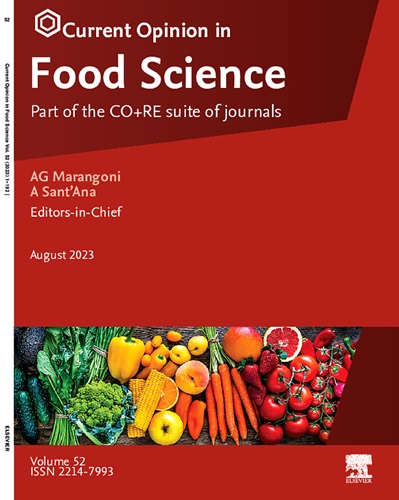Targeting bacterial spores with metallic nanoparticles: a promising alternative for food safety
IF 8.9
1区 农林科学
Q1 FOOD SCIENCE & TECHNOLOGY
引用次数: 0
Abstract
Bacterial spore contamination, often overlooked, presents a significant challenge to the food industry. Spores in bacterial biofilms can resist physical and chemical disinfection treatments and can potentially reinitiate biofilm formation on surfaces and pipelines. Recent studies highlight the potential of metallic nanoparticles, such as silver and iron oxide, in inhibiting spores through mechanisms like structural disruption, spore coat rupture, and germination inhibition. Sporicidal properties of metallic nanoparticles have not previously been extensively explored. This review consolidates previous research on nanoparticle-based sporicidal mechanisms, evaluates their effectiveness, and discusses future research direction for enhancing their efficacy. Metallic nanoparticles offer a promising alternative to chemical disinfectants to inhibit the resistant bacterial spores potentially improving food safety while minimizing environmental impact.
用金属纳米颗粒靶向细菌孢子:一种有希望的食品安全替代方案
经常被忽视的细菌孢子污染对食品工业提出了重大挑战。细菌生物膜中的孢子可以抵抗物理和化学消毒处理,并可能重新启动表面和管道上的生物膜形成。最近的研究强调了金属纳米颗粒的潜力,如银和氧化铁,通过结构破坏、孢子外壳破裂和发芽抑制等机制抑制孢子。金属纳米颗粒的杀孢特性以前没有得到广泛的研究。本文综述了基于纳米颗粒的杀孢机制的研究进展,对其有效性进行了评价,并对未来的研究方向进行了探讨。金属纳米颗粒提供了一种很有前途的化学消毒剂替代品,可以抑制耐药细菌孢子,可能提高食品安全,同时最大限度地减少对环境的影响。
本文章由计算机程序翻译,如有差异,请以英文原文为准。
求助全文
约1分钟内获得全文
求助全文
来源期刊

Current Opinion in Food Science
Agricultural and Biological Sciences-Food Science
CiteScore
18.40
自引率
4.00%
发文量
157
审稿时长
92 days
期刊介绍:
Current Opinion in Food Science specifically provides expert views on current advances in food science in a clear and readable format. It also evaluates the most noteworthy papers from original publications, annotated by experts.
Key Features:
Expert Views on Current Advances: Clear and readable insights from experts in the field regarding current advances in food science.
Evaluation of Noteworthy Papers: Annotated evaluations of the most interesting papers from the extensive array of original publications.
Themed Sections: The subject of food science is divided into themed sections, each reviewed once a year.
 求助内容:
求助内容: 应助结果提醒方式:
应助结果提醒方式:


